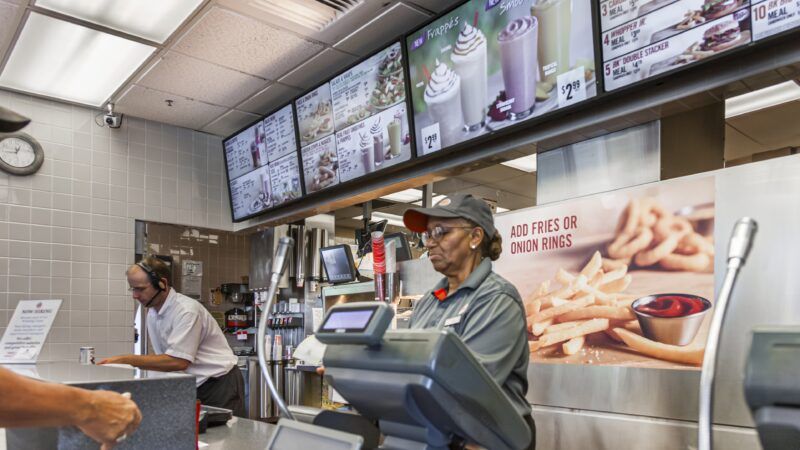California's Minimum Wage Law Has Led Some Employers To Cut Hours and Hike Prices
"I've been in the business for 25 years...I never had to increase the amount of pricing that I did this past time in April," one business owner told the A.P.

Last September, California Governor Gavin Newsom (D) signed a bill mandating a $20 minimum wage for fast food workers. The new wage is among the highest in the county, surpassing even Washington, D.C.'s $17.50 minimum wage. While supporters touted the wage increase as a way to help struggling Californians, detractors warned that restaurant owners would respond by laying off workers, cutting their hours, or speeding up the already starting shift to automation.
The law went into effect in April, meaning that it's likely too early to tell what the ultimate effects of the law will be. However, a recent report from the Associated Press detailed concerns from several California fast food restaurant owners who say they've been forced to reduce hours and hike food prices.
"We kind of just cut where we can," Lawrence Cheng, whose family owns several Wendy's franchises told the A.P. "I schedule one less person, and then I come in for that time that I didn't schedule and I work that hour."
Juancarlos Chacon, who owns nine Jersey Mikes locations in Los Angeles told the A.P. that he's resorted to reducing staff, cutting his part-time workers by about 20 employees. He's also had to raise prices. A turkey sub, for example, that used to be under $10 now costs $11.15. As a result, the amount customers spend, he says, has been falling.
"I've been in the business for 25 years and two different brands and I never had to increase the amount of pricing that I did this past time in April," he told the A.P.
It shouldn't be surprising that many business owners have resorted to laying off employees, raising prices, or reducing hours.
"When labor costs jump more than 25 percent overnight, any restaurant business with already-thin margins will be forced to reduce expenses elsewhere," Jot Condie, president and CEO of the California Restaurant Association told the A.P. "They don't have a lot of options beyond increasing prices, reducing hours of operation, or scaling back the size of their workforce."
As these stories show, while large minimum wage increases are great for those who manage to stay employed, many employers simply can't afford to absorb the higher labor costs. They end up passing those costs onto the consumer by hiking prices or hiring fewer workers. Unemployed workers receive the real minimum wage: $0.


Show Comments (30)